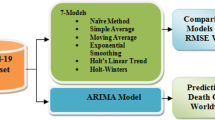Abstract
An extremely infectious disease, coronavirus disease 2019 (COVID-19) nowadays, is continuously threatening the whole world by its omnidirectional spreading. The aggressiveness and impact of COVID-19 disease worldwide have made the World Health Organization (WHO) to declare it as global pandemic. Machine learning (ML), an application of AI, can be implemented efficiently to track COVID-19, predict the increase of the pandemic, and design approaches to limit its spread. In this paper, three ML regression techniques, namely linear regression, polynomial regression, and support vector regression, are used to propose a model. Some experiments are performed on the online time series data from the dashboard of Johns Hopkins University sourced from Github repository using Python language to predict the affected people in the next 60 days. This article will help out in creating awareness among people toward the prevention of spread of infection due to COVID-19.
Access this chapter
Tax calculation will be finalised at checkout
Purchases are for personal use only
Similar content being viewed by others
References
Wang, C., Horby, P.W., Hayden, F.G., Gao, G.F.: A novel coronavirus outbreak of global health concern. Lancet 395, 470–473 (2020)
Coronavirus—worldometer. Retrieved from https://www.worldometers.info/coronavirus/
Li, G., DeClercq, E.: Therapeutic options for the 2019 novel coronavirus (2019-ncov)
Kerala reports first confirmed coronavirus case in India—India News. Retrieved from https://www.indiatoday.in/india/story/kerala-reports-first-confirmed-novel-coronavirus-case-in-india-1641593-2020-01-30. 28 March 28 2020
Mele, M., Magazzino, C.: Pollution, economic growth, and COVID-19 deaths in India: a machine learning evidence. Eniviron. Sci. Pollut. Res. 1–9 (2020)
Zhu, W., Xie, K., Lu, H., Xu, L., Zhou, S., Fang, S.: Initial clinical features of suspected Coronavirus Disease 2019 in two emergency departments outside of Hubei, China. J. Med. Virol. (2020)
Tuli, S., Tuli, S., Tuli, R., Gill, S.S.: Predicting the growth and trend of COVID-19 pandemic using machine learning and cloud computing. Internet Things 11 (2020)
Salgotra, R., Gandomi, M., Gandomi, A.H.: Time series analysis and forecast of the COVID-19 pandemic in India using genetic programming. Chaos, Solitons Fractals 138 (2020)
Malki, Z., Atlam, E., Hassanien, A. E., Dagnew, G., Elhosseini, M. A., Gad, I., Association between weather data and COVID-19 pandemic predicting mortality rate: Machine learning approaches. Chaos, Solitons and Fractals. Vol. 138 (2020)
Burdick, H., Lam, C., Mataraso, S., Siefkas, A., Braden, G., Dellinger, R.P., McCoy, A., Vincent, J., Green-Saxena, A., Barnes, G., Hoffman, J., Calvert, J., Pellegrini, E., Das, R.: Prediction of respiratory decompensation in COVID-19 patients using machine learning: the READY trial. Comput. Biol. Med. 124 (2020)
Sun, C.L.F., Zuccaralli, E., Zerhouni, E.G.A., Lee, J., Muller J., Scott, K.M., Lujan, A.M., Levi, R.: Predicting COVID-19 infection risk and related risk drivers in nursing homes: a machine learning approach. J. Am. Med. Directors Assoc. (2020)
Hasan, N.: A Methodological approach for predicting COVID-19 epidemic using EEMD-ANN hybrid model. Internet Things 11 (2020)
Wadhwa, P., Aishwarya, Tripathy, A., Singh, P., Diwakar, M., Kumar, N.: Predicting the time period of extension of lockdown doe to increase in rate of COVID-19 cases in India using machine learning. In: Materials Today: Proceedings (2020)
Wang, P., Zheng, X., Li, J., Zhu, B.: Prediction of epidemic trends in COVID-19 with logistic model and machine learning technics. Chaos, Solitons Fractals 139 (2020)
Yadav, M., Perumal, M., Srinivas, M.: Analysis on novel coronavirus (COVID-19) using machine learning methods. Chaos, Solitons Fractals 139 (2020)
Ghosh, P., Ghosh, R., Chakraborty, B.: COVID-19 in India: state-wise analysis and prediction. JMIR Public Health Surveillance 6(3) (2020)
Das, A., Mohanty, M. N.: Covid-19 detection from x-ray images using convolutional neural network. Int. J. Adv. Sci. Technol. 29(8) (2020)
Mohapatra, S.K., Mohanty, M.D., Mohanty, M.N.: Corona virus infection probability classification using support vector machine. Int. J. Adv. Sci. Technol. 29(8) (2020)
Novel Coronavirus (COVID-19) Cases, provided by JHU CSSE. Retrieved from https://github.com/CSSEGISandData/COVID-19
Author information
Authors and Affiliations
Corresponding author
Editor information
Editors and Affiliations
Rights and permissions
Copyright information
© 2021 The Author(s), under exclusive license to Springer Nature Singapore Pte Ltd.
About this paper
Cite this paper
Pati, A., Parhi, M., Pattanayak, B.K. (2021). COVID-19 Pandemic Analysis and Prediction Using Machine Learning Approaches in India. In: Das, S., Mohanty, M.N. (eds) Advances in Intelligent Computing and Communication. Lecture Notes in Networks and Systems, vol 202. Springer, Singapore. https://doi.org/10.1007/978-981-16-0695-3_30
Download citation
DOI: https://doi.org/10.1007/978-981-16-0695-3_30
Published:
Publisher Name: Springer, Singapore
Print ISBN: 978-981-16-0694-6
Online ISBN: 978-981-16-0695-3
eBook Packages: Intelligent Technologies and RoboticsIntelligent Technologies and Robotics (R0)




